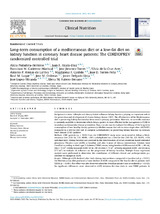Long-term consumption of a mediterranean diet or a low-fat diet on kidney function in coronary heart disease patients: The CORDIOPREV randomized controlled trial
Autor
Podadera-Herreros, Alicia
Alcalá Díaz, Juan Francisco
Gutiérrez Mariscal, Francisco Miguel
Jiménez Torres, José
Cruz Ares, Silvia de la
Arenas de Larriva, Antonio P.
Pérez Cardelo, Magdalena P.
Torrez-Peña, Juan David
Luque, Raúl M.
Ordovás, José María
Delgado-Lista, Javier
López-Miranda, José
Yubero-Serrano, Elena M.
Editor
ElsevierFecha
2022Materia
Kidney functionCoronary heart disease
Secondary prevention
Lifestyle
Mediterranean diet
Dietary intervention
METS:
Mostrar el registro METSPREMIS:
Mostrar el registro PREMISMetadatos
Mostrar el registro completo del ítemResumen
Background & aims: Lifestyle and dietary habits influence kidney function, playing an important role in the prevention and development of chronic kidney disease (CKD). The effectiveness of the Mediterranean diet in preserving kidney function has been seen in primary prevention. However, no scientific evidence is currently available to determine which dietary pattern is more effective in the management of CKD in secondary cardiovascular disease prevention. Thus, our aim was to evaluate the efficacy of the long-term consumption of two healthy dietary patterns (a Mediterranean diet rich in extra-virgin olive oil (EVOO) compared to a low-fat diet rich in complex carbohydrates) in preserving kidney function in coronary heart disease (CHD) patients.
Methods: CHD patients (n = 1002) from the CORDIOPREV study were randomized to follow a Mediterranean diet (35% fat, 22% MUFA, <50% carbohydrates) or a low-fat diet (28% fat, 12% MUFA, >55% carbohydrates). Kidney function was assessed by the determination of serum creatinine-based estimated glomerular filtration rate (eGFR) at baseline and after 5-years of dietary intervention. Patients were classified according to their type 2 diabetes (T2DM) status, using baseline eGFR (normal eGFR: ≥ 90 mL/min/1.73 m2; mildly-impaired eGFR: 60 to <90 mL/min/1.73 m2, severely-impaired eGFR: <60 mL/min/1.73 m2) to evaluate its influence on the progression of kidney function. Multiple linear regression analysis were performed to determine the contribution of different clinical and anthropometric parameters to changes in eGFR.
Results: Although eGFR declined after both dietary interventions compared to baseline (all p < 0.001), the Mediterranean diet produced a lower decline of eGFR compared to the low-fat diet in patients with T2DM (p = 0.040). This effect was also observed when the overall population was considered (p = 0.033). No significant differences were observed in eGFR between the two diets in non-T2DM patients. In addition, this differential effect of the Mediterranean diet was mainly observed in patients with mildly-impaired eGFR in which this diet slowed eGFR progression (p = 0.002).
Conclusions: The long-term consumption of a Mediterranean diet rich in EVOO, when compared to a low-fat diet, may preserve kidney function, as shown by a reduced decline in eGFR in CHD patients with T2DM. Patients with mildly-impaired eGFR may benefit more from the beneficial effect of the consumption of the Mediterranean diet in preserving kidney function. These findings reinforce the clinical benefits of the Mediterranean diet in the context of secondary cardiovascular disease prevention.

